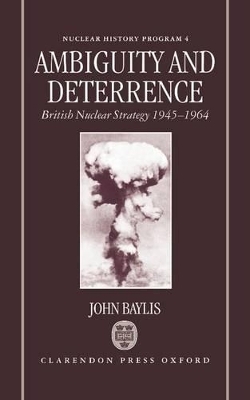
Ambiguity and Deterrence
British Nuclear Strategy 1945-1964
Seiten
1995
Clarendon Press (Verlag)
978-0-19-828012-5 (ISBN)
Clarendon Press (Verlag)
978-0-19-828012-5 (ISBN)
This book focuses on the disagreements which existed in British political and military circles over nuclear strategy during the period from 1945 to 1964. Based on recently released documents, the book argues that British policy in this important area was much more ambiguous and much less coherent than is usually supposed.
Ambiguity and Deterrence focuses on the role of competing strategic beliefs in the formulation of British nuclear strategy between 1945 and 1964. Based on recently released documents, it is argued that the British approach to nuclear weapons during this formative period was characterized by paradox and ambiguity. The paradox was that while there was a widespread consensus in political and military circles in favour of nuclear deterrence, there were constant disagreements over the requirements of an effective deterrent policy. These disagreements centred on six main questions: whether deterrence was best achieved through `punishment' or `denial'; whether deterrence necessitated nuclear superiority; whether preparations had to be made for a long war or a short war; what strategic implications followed from nuclear stalemate; whether limited nuclear wars could be fought without escalation to all-out nuclear war; and whether pre-emption was politically acceptable and militarily necessary. It is argued that the failure of successive governments to provide clear political direction on these issues meant that British nuclear strategy was more ambiguous and much less coherent than is usually supposed.
Ambiguity and Deterrence focuses on the role of competing strategic beliefs in the formulation of British nuclear strategy between 1945 and 1964. Based on recently released documents, it is argued that the British approach to nuclear weapons during this formative period was characterized by paradox and ambiguity. The paradox was that while there was a widespread consensus in political and military circles in favour of nuclear deterrence, there were constant disagreements over the requirements of an effective deterrent policy. These disagreements centred on six main questions: whether deterrence was best achieved through `punishment' or `denial'; whether deterrence necessitated nuclear superiority; whether preparations had to be made for a long war or a short war; what strategic implications followed from nuclear stalemate; whether limited nuclear wars could be fought without escalation to all-out nuclear war; and whether pre-emption was politically acceptable and militarily necessary. It is argued that the failure of successive governments to provide clear political direction on these issues meant that British nuclear strategy was more ambiguous and much less coherent than is usually supposed.
| Erscheint lt. Verlag | 28.12.1995 |
|---|---|
| Reihe/Serie | Nuclear History Program ; 4 |
| Verlagsort | Oxford |
| Sprache | englisch |
| Maße | 145 x 224 mm |
| Gewicht | 769 g |
| Themenwelt | Natur / Technik ► Fahrzeuge / Flugzeuge / Schiffe ► Militärfahrzeuge / -flugzeuge / -schiffe |
| Geschichte ► Allgemeine Geschichte ► Zeitgeschichte | |
| Geisteswissenschaften ► Geschichte ► Regional- / Ländergeschichte | |
| Sozialwissenschaften ► Politik / Verwaltung | |
| ISBN-10 | 0-19-828012-2 / 0198280122 |
| ISBN-13 | 978-0-19-828012-5 / 9780198280125 |
| Zustand | Neuware |
| Haben Sie eine Frage zum Produkt? |
Mehr entdecken
aus dem Bereich
aus dem Bereich
von der Machtergreifung bis zur Gründung der Vereinten Nationen
Buch | Softcover (2023)
Motorbuch Verlag
CHF 38,90


